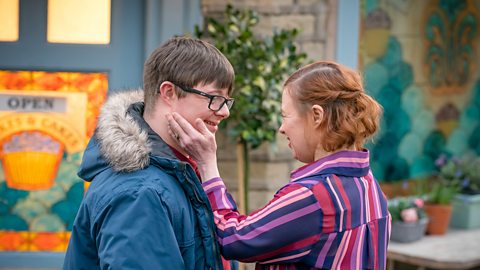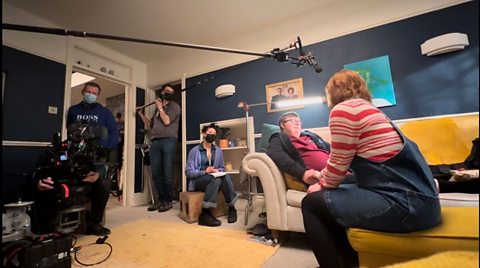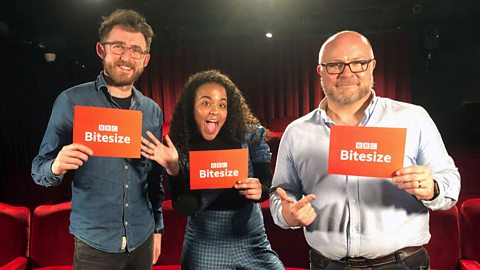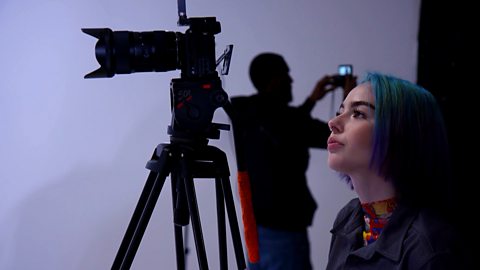What is Ralph and Katie about?
BBC One drama Ralph & Katie breaks boundaries in terms of inclusivity and representation. Originally broadcast in late 2022, the series is a spin-off of TV drama series The A Word, which ran for three series and featured the popular wedding of characters Ralph and Katie towards the end.
The six-part comedy drama follows Ralph and Katie as they navigate married life, and is the first British show to have two actors with Down’s syndrome as its lead characters. The production also featured predominantly-disabled writers and a disabled director, Jordan Hogg, which led to a new way of working both on and off set.
BBC One drama Ralph & Katie. video
Find out more about the uplifting story of Ralph & Katie on BBC One.

What's a creative coach?
The series producer engaged with the role of a ‘creative coach’ in a unique way, to help the two main actors navigate things like scripts and the order of filming (which isn’t chronological when filming for TV). Jess Mabel Jones, whose background is in theatre, took on the role of creative coach and believes it made a huge difference not only to the lead actors, Leon Harrop and Sarah Gordy, but to everyone working on the production: “We were creating a different environment on set, a cohesive one where everyone felt empowered. We also did a lot of dancing – it’s a great leveller and a way of relieving tension!”
Jess Mabel Jones talks about the impact dancing had on the whole crew
Jess Mabel Jones:
Number one is dancing. We've done loads and loads of dancing. Being in front of a camera can be quite a nervous making activity. To dismantle some of those ideas of hierarchy and to loosen everybody up and remind everyone this is a really friendly workplace. And this, above everything should be fun and joyful so we start by dancing.

What is Down’s syndrome?
Down’s syndrome is when you’re born with an extra chromosome. People who have it have some level of learning disability. Like everyone, they also have their own likes, dislikes and unique personality that makes them who they are. The ability of people who have Down's syndrome to hold and process verbal information is generally not as good as their ability to hold and process visual information, which can make it more difficult to learn new words and sentences. It can also make it more difficult to process spoken language, which is why things like pictures, signs and easy-read printed language can help.

How was the production made more accessible?
Working with Access All Areas, an inclusive theatre company which works with learning disabled and autistic performers, the production team created simple innovations. Things like easy-read call sheets containing a simple list of the most important information, like what time they’re starting filming, where, what time lunch is and when they’ll finish. They also gave everyone name tags, so no one was worrying about remembering people’s name; and access passports, which meant anyone could divulge information and ask for any adjustment they needed. Jess says: “They were sent out to everyone, not just people we thought might ask. So, some people who’d never asked before, or who didn’t identify as disabled, also asked for things. They were all able to do their jobs to the best of their ability.”
Setting the bar for production inclusivity
Leon Harrop:
What is your favourite thing Ralph & Katie?
Jules Hussey:
My favourite thing on Ralph & Katie is actually not about the story, it's not about the characters.
It's about all the amazing people that are working together to make it.
It's about two fantastic lead actors, but also, behind them, the brilliant crew, with so many different types of people with different experience, all that amazing energyand vision and different ways of thinking that we've got on board.
They really make the series better and bigger.
Peter Bowker:
I wanted to make sure that the writers involved were disabled writers because I knew there was a whole kind of wealth of talent out there that wasn't really being utilised.
Tom Wentworth:
I think having a disabled director, having a disabled cast, having members of the crew, it is absolutely vital for a show like this.
Jordan Hogg:
We've one of the most diverse cast and crew in the industry. I valueeveryone's opinion and ideas and thoughts, and I think the more of a diverse range we have of them ideas and thoughts, the better and the stronger the show will be, really.
I feel like we're kind of ground-breaking in doing what we're doing.
Jess Mabel Jones:
Everyone is entitled to be here.
Everyone that perhaps has previously felt marginalised or felt unwelcome, if you havea really inclusive workplace, then suddenly everyone's like, "Oh, yeah," like,"this is what we look like."
(EMMA SOBS IN NEXT ROOM)
Emma: I'm at a mate's.
Yeah. Yeah, yeah, I'm OK.
Sarah Gordy:
Who's she calling at this time?
Leon Harrop:
A taxi?
Nick Llewellyn:
It's going to make a lot of moves, not just in the TV world, but also in audiences that are going to be watching it.
I think it's an incredible shift in the television industry to have two leading roles played byDown's syndrome actors. It's really radical and I think it's really funny and I thinkit's really poignant and really touching as well, as a script.
Peter Bowker:
Once that interacting starts to take place, then it becomes impossibleto stereotype people, because you have a range of people with disabilities, with a rangeof characteristics, just like everywhere else.
And that might sound very simplistic, but I don't think that's a lesson we can learn often enough.
Dylan Brady:
From the beginning, we knew that there were going to be reasonable adjustments made on the set to accommodate for everyone's needs, and actually it made the entire shoot just a dream.
Sherry Baines:The atmosphere on set, I couldn't fault.
It was a wonderful, happy, supportive, kind environment.
Sarah Gordy:
I think it's good for the… for the industry to see people who are different, of all walks of life, trying to have a career.
Jess Mabel Jones:
In my experience, the reason that people don't change stuff is because they thinkit's too difficult to - and we've proved it's not!
I was there to make sure they could do the best job they could, and in an informed way.
Jess – who is neurodivergent herself – started working with Leon and Sarah five weeks before the shoot. She worked with them as an acting coach and director on set: "People with learning disabilities might have difficulty processing written information, understanding instructions or remembering to take breaks. However, the coaching I gave was bespoke to each actor. It’s important to remember that every learning disability is different and no two people with the same condition will require the same adjustments. That’s why rehearsing with the actors before beginning shooting was imperative – we needed time to work together to get to know each other and discover how best to collaborate." She would translate the director’s notes into an easy-read or spoken direction for them and she would feed back to the script supervisor and editor on small adjustments that might help when they were filming. She would also suggest when they needed to take a break, or she would also push for more time on a scene if it needed one more take: “I knew what Sarah and Leon could achieve. I was there to make sure they could do the best job they could, and in an informed way.”
Jess Mabel Jones talks about her role as a creative coach on Ralph & Katie
Sarah Gordy:
Good luck darling.
Leon Harrop:
Jess is why… good coach… help me and Sarah out. And…
Nick Llewellyn:
Brilliant!
Leon Harrop:
She’ll be up to help me on Saturday
Nick Llewellyn:
That's good.
Leon Harrop:
waiting with people like me or Sarah.
Jess Mabel Jones:
We went through each of the episodes. We understood what was happening in each scene. We had conversations about that. So, when it came to shooting, which is often kind of out of sequence, it meant that we had a good understanding of what was happening at each point.
Sarah Gordy:
Jess is fantastic. She is like my girlfriend and we get on like a house on fire. She's fantastic on set and she's always there to encourage me and Leon and we make a great team.
Jess Mabel Jones:
I also support them on set and that can look like a whole host of things and it changes every day.
Leon Harrop:
Jess, like, help me with my lines, the moves, how to say it properly, helping me with my lines…
Nick Llewellyn:
With the performances and finding Ralph, finding your character. Yeah,
Jess Mabel Jones:
Prior to this job, I hadn't been on a TV set before. I think it actually lends itself incredibly well to inclusive working. There's a huge level of organisation that has to happen in order for the days to go ahead. So it's ready made for this sort of an inclusive process. Proper inclusion is about good planning beforehand because we've been having conversations about how better to communicate with one another. It's meant that across the board, everybody's been communicating better.
Leon Harrop:
I never had worked with Jess before work. We did our first time, a creative coach with me. I've done programmes where I was struggling. I can't do anything, I can't … act it and know what, direct it as well, but on this… Really…
Jess Mabel Jones:
I think there's an added challenge here from us to everybody else to makers, to writers, directors, producers, executives to say, OK, it's not only about representation, it's not only about what does your cast look like, it's also about material that they are working on. We have two lead characters of this show are learning disabled. Their stories are complex and they're not centred around disability and I think that is a pretty cool thing to be like … my drop, come match us.
Jess says: “There’s always a lot of apprehension around working with disabled people – people panic about saying or doing the wrong thing, so it was about alleviating any fear and empowering everyone on set to be and work cohesively. That definitely was achieved. It was really joyful and no one was nervous by the end. People will now actively want to work on an inclusive set.
“I think it reminded us that making TV can be irreverent and fun, and nobody needs to be a tyrant. I think TV has a reputation of being a bit cruel, of schedules being extremely long and hard, and in order to do a job work has to be hard. But I always say ‘good work, not hard work’. You don’t need to be having a horrible time in order to do your job well. You can have a wonderful time and still get the job done.”
The show is also inclusive on our screens as well as behind-the-scenes. There are captions and audio description, and there’s a ‘visual story’ for each episode: an easy-read guide which introduces the characters and explains the synopsis. Each main character has an audio description of themselves which you can also access separately. Jess says: “It’s so important for our show to be accessible to the very people we’re representing on screen. And it’s relatively easy! I really hope that Ralph & Katie and all of the surrounding material is going to be a bit of a provocation to the rest of the industry: we did it, we finished on time, under-budget. What are you going to do?”
She adds: “We need some fresh minds, we need some fresh perspectives. I come from theatre and I think TV kind of needed me because we do things a little differently in theatre. The [TV] industry needs a bit of a shake-up, so get on board young folks. We need ya!”

Four trainee stories on Ralph & Katie
Four trainees on BBC One drama Ralph & Katie tell us about the job they did, and how their disabilities were accommodated on and off set.

How do you get into film? Ask the expert Q&A. video
Oscar-winning film expert, Gareth Ellis-Unwin, answers your questions about getting into the film industry in a Q&A hosted by Radio 1's Ali Plumb and Get Into Film's Shanai.

Job inspiration: Careers in media collection
Hear from young people about how they got started in their careers in media.
